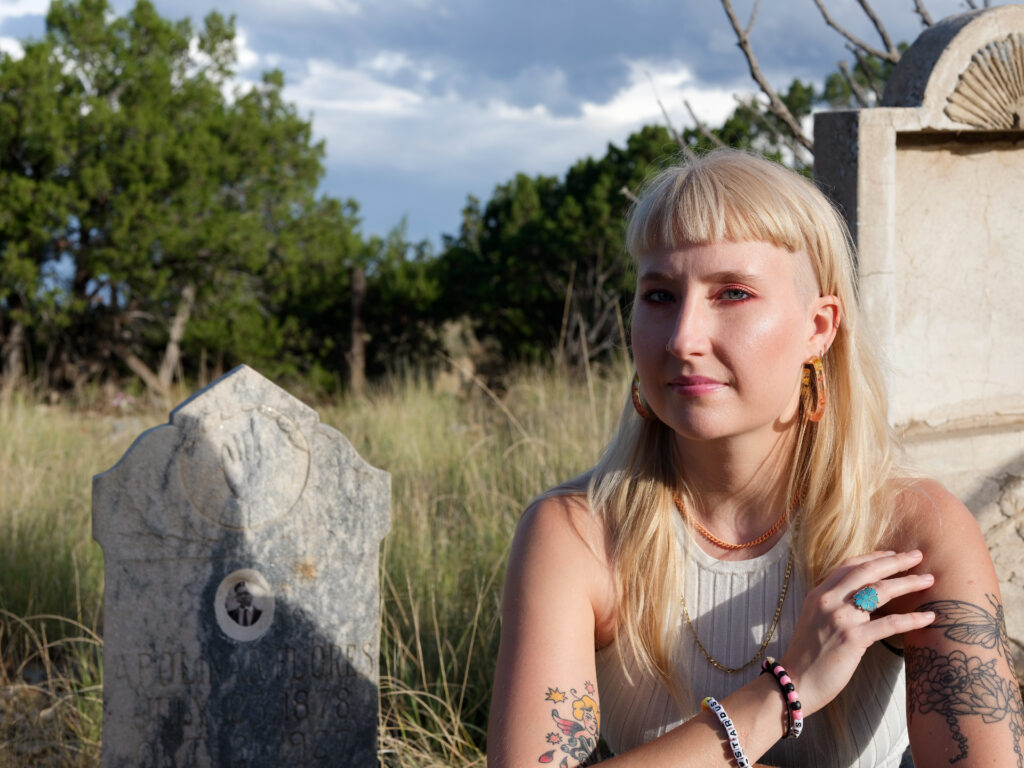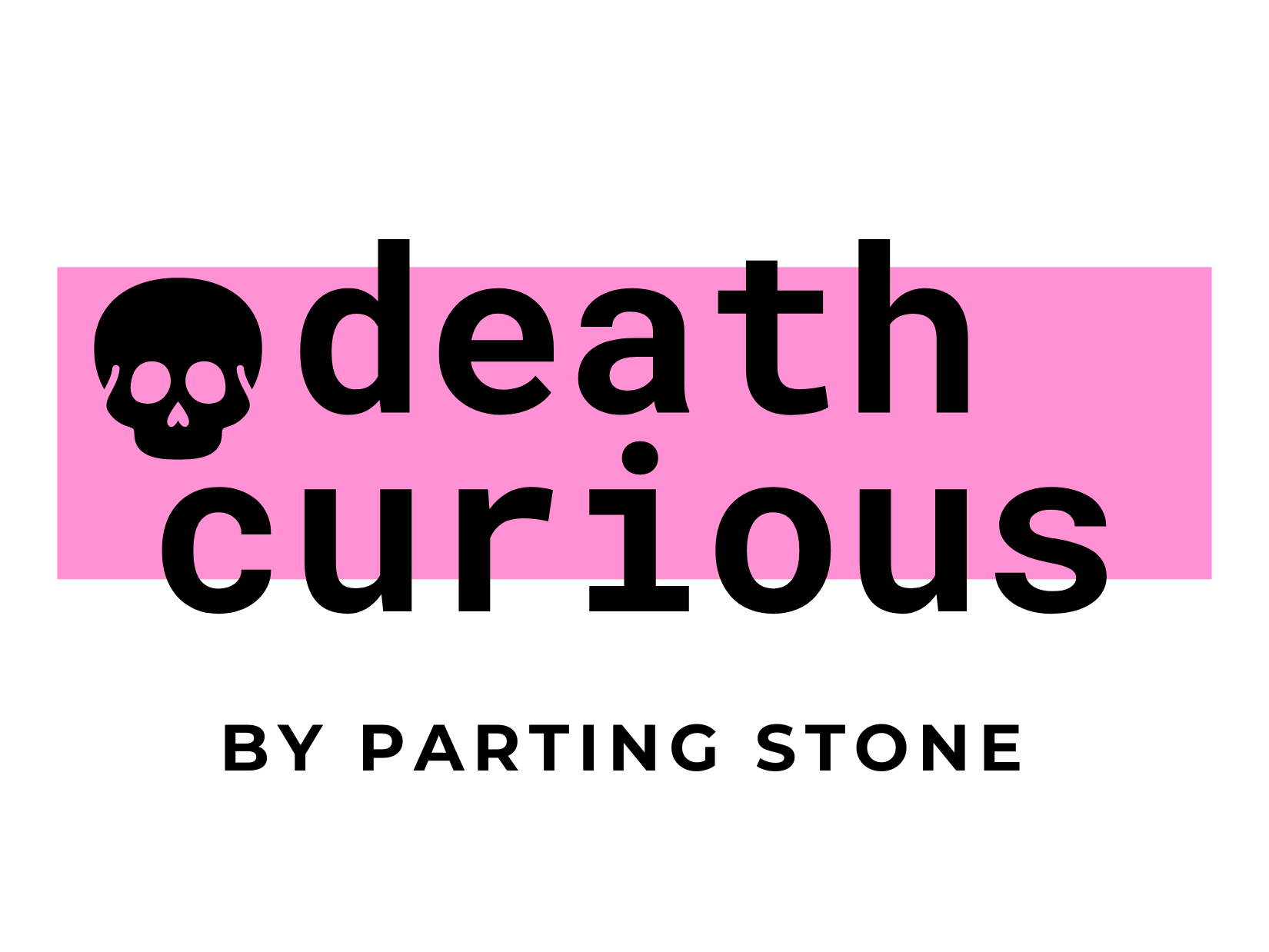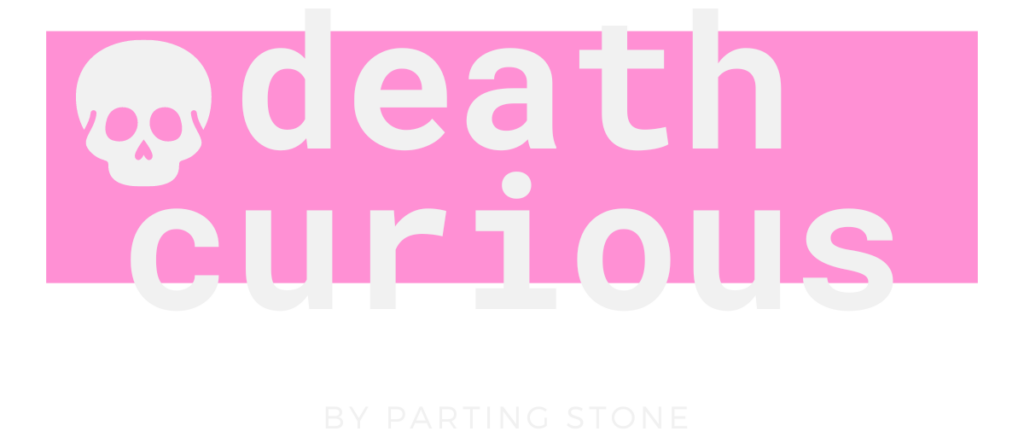It’s hard to believe that the Death Curious website turns 6 months old in September! Since then, the Death Curious blog, podcast, and social media accounts have received overwhelmingly positive responses from the death care profession and beyond. I’ve been so excited to see how quickly Death Curious has grown: we have over 6,000 followers on tiktok, and our podcast has been listened to over 11,000 times. It’s been especially wonderful to begin building a community of like minded death curious people in association with Parting Stone, Death Curious’ parent company. It has been an incredibly fun and fulfilling experience launching a platform that I care so deeply about and working towards the shared goal of dismantling death avoidance with death curious education.
With all of this in mind, it’s serendipitously appropriate that last week, Parting Stone’s Marketing Manager interviewed me for the company’s monthly newsletter. I thought that Death Curious readers would be interested in learning a bit more about me and my perspectives as a death curious person and educator. So, here are my answers to the interview questions, so you can get to know me, Alexandra Jo– the voice behind death curious– a little better:

Why do you think it’s important to provide death positive education?
“First, I want to articulate that I put “death curious” education out into the world. I’m a big believer in the harms that toxic positivity and rigid expectations around our emotions can have. I think that curiosity is more accessible than positivity to a lot of people when it comes to thinking about death, and honestly will yield the same or better results when aiming to dismantle death avoidance.
On that note, it’s important to get death curious and/or death positive education out into the world because we have such a problem with death avoidance in modern culture. Death avoidance can cause tons of issues on a personal level, like personal anxiety, frustration with living family members who are unwilling to talk about end of life issues, harmful end of life care for marginalized populations like queer, trans, and bipoc folx, distanced relationships from people we love, and lack of good, personal death planning, as well as larger negative societal impacts. These problems result in disappointing memorials, self-doubt about end of life decisions we make for our loved ones, disenfranchised and complicated grief, and grief avoidance.
Death avoidance also causes so many problems for the death care profession. Professionally, part of my job is to work with funeral professionals, and the other part is to work with the general public. I’ve found that there is a huge gap in what people expect when they enter a funeral home, and what funeral home culture/funeral home owners, etc. expect funeral directors to provide. I think that death avoidance is largely to blame for this gap in knowledge, as families aren’t thinking about or talking about what they want, or educating themselves on options, before there is a need, and funeral directors can’t possibly offer every single option to every single family in every single meeting. I hear often from funeral homes “we don’t offer green burial because no one asks for it” but how is a family expected to ask for something they don’t know is an option? Hopefully Death Curious can help educate people ahead of time and start to bridge this gap in need and knowledge.
Finally, Education that is honest about death, but that also strives to cultivate a healthier perspective around human mortality is an important part of helping people accept the reality of death and the role it plays in each human life. We have research now which reveals that when people stop being death avoidant and have a healthy perspective on mortality people actually lead happier lives. An awareness of mortality can improve physical health and help us re-prioritize our goals and values.
So, death curious education is important for humans on a personal level, as well as helping funeral professionals be able to serve families better.“
Stay up to date on our death curious education by signing up for the newsletter
What is one of the most exciting trends or changes you’ve noticed in the death care industry?
“For me, one of the most exciting trends I’ve seen in death care since my own mom passed away in 2006, is the availability of so many more options for both memorial events and disposition methods. I love that it’s more common to use celebrant services, because after going through celebrant training myself, I deeply understand how those services are crafted to be meaningful to each specific family from start to finish. I love seeing more people get creative with what a memorial service looks like. Maybe it’s an all night dj dance party, maybe it’s a display of beloved memorabilia that belonged to the deceased, maybe it’s a church service. All are valid and I see more and more people being creative with what makes meaning for their loved ones. I also love that there are more advances in offering eco-friendly disposition methods. I think we still have a long way to go on this one, as there is so much push back from so many traditional funeral homes, but at the end of the day, if an option has value and meaning to a family, why deny them that, even if you wouldn’t choose the option for yourself? We’ve come a long way here, with alkaline hydrolysis and green burial specifically, which is exciting…and I think we still have a long way to go.“
Do you have any predictions for upcoming trends in the death care Industry?
“As millennials and gen z age into death planning, I think we are going to see more and more people looking for different, new, unique, and more eco friendly options in this space all around. We have tons of data to back up the fact that consumers across industries are already changing their purchasing habits to be more environmentally conscious, and trends predict that younger people are doing this at higher rates than ever. Death care will be no exception to that rule.“
Can you tell us about some of your favorite examples of death positivity in pop culture?
“Most recently, the Barbie movie! It might be the most death positive film I’ve ever seen in theaters, and I just made a series of tiktoks about it that you can watch on my Tiktok page! It’s wonderfully executed and completely unexpected in that movie! Other favorites of mine are:
- Buffy the Vampire Slayer– death and mortality in general is a core theme of the show and is talked about and presented in extremely meaningful and real ways, especially in the later seasons. This show also represents one of the most accurate experiences of grief and loss that I’ve ever seen in any media. It does a beautiful job using camera work, sound, and writing to portray how it feels in that situation better than any other media I’ve seen.
- The Good Place– Similar in theme to Barbie, the good place emphasizes that it’s actually death– our human finiteness and the fact that our lives end– which makes our lives have meaning. I love this message, and the whole show has some hilarious and fun takes on the afterlife as well.“
What does being death positive mean to you?
“This is an interesting question because, while I think the death positive movement is an excellent one, I personally am actually more interested in being death curious. The difference there actually comes from my history of disordered eating and body dysmorphia, and the difficult relationship I have with the “body positivity” movement. Often, body positivity is not an attitude that is achievable to me. When I can’t get to a place of “I love my body” mentally, I feel like a failure and that adds stress and upset to the already distressing and upsetting emotional place that I’m in. What I have discovered is that curiosity about my body is way more accessible to me a majority of the time. What can my body do today? How does my body feel today? What’s up with these hairs on my legs, or these freckles on my shoulders right now? Curiosity is actually a much better space for me to exist in. And those are my exact same feelings around thinking about and understanding death. After experiencing a few unexpected and traumatic losses in my young adult life, feeling positively about my grief and the impending deaths of everyone else I know and love seems out of reach some days. What I can get excited about is being curious about death… what it means, where we go, what happens to us physically and spiritually. I can think about different options for what to do with my body and wonder what would feel best for me and my loved ones. I can learn about ways that other people think about and process grief in order to feel less alone, and get curious about the best, most helpful ways to connect with others in these spaces. Sometimes it’s a joyful, positive experience to think about these things… and sometimes it still makes me sad or nervous. The important thing is that that’s ok! Curiosity allows space for all of the complicated and messy feelings that humans can have when facing our mortality, and that’s what is most important when having an honest relationship with death. Getting comfy with the uncomfortable is actually what allows us to accept hard things, and move through them in healthy ways, especially hard things that are out of our control, like death. So, I guess for me, being death positive actually means being death curious.“
For more death curious content and education, sign up for the Death Curious newsletter. You’ll be notified when there is a new blog post, so you won’t miss out what the Death Curious community is talking about!



